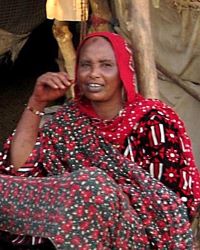Daza in Chad

Photo Source:
David Stanley - Flickr
Creative Commons
|
Send Joshua Project a map of this people group.
|
| People Name: | Daza |
| Country: | Chad |
| 10/40 Window: | Yes |
| Population: | 629,000 |
| World Population: | 728,000 |
| Primary Language: | Dazaga |
| Primary Religion: | Islam |
| Christian Adherents: | 0.00 % |
| Evangelicals: | 0.00 % |
| Scripture: | Portions |
| Ministry Resources: | No |
| Jesus Film: | Yes |
| Audio Recordings: | Yes |
| People Cluster: | Kanuri-Saharan |
| Affinity Bloc: | Sub-Saharan Peoples |
| Progress Level: |
|
Introduction / History
The Daza are a rugged Muslim people who live in southwestern Chad and Niger. Those in Chad primarily inhabit the southern fringes of the Sahara Desert. They have the reputation of being fierce and independent, and they are organized by tribes and clans. Although their tribal chiefs have some influence, they have little actual control over the clans.
The Daza are known for their fighting and are disliked and feared by some of their neighbors. Many Daza, including the women, carry daggers under the sleeves of their garments. They think highly of themselves and take pride in their reputation as warriors. They are well known for their ability to go for long periods of time with little food or water.
What Are Their Lives Like?
Traditionally, the Daza raised cattle, camels and goats. Unfortunately, the expanding Sahara Desert has destroyed many of the pasture lands that are necessary for supporting cattle. Most of their income comes from selling livestock. Today, the men occasionally find steady work in towns or cities.
Daza men wear loose-fitting draw-string pants under long-sleeved robes. Their clothing is usually white, and they often wear turbans or small Muslim caps. Daza women traditionally wear long wrap-around dresses and head coverings. Modesty requires that women cover their arms, legs and heads. Jewelry is also an important part of the women's adornment. Although the Daza are not required to wear veils, they often wear them for protection against the sun, dust or cold weather.
Daza society is male-dominated. Marriages are often arranged, and gifts are exchanged between the couples' families. Some of the Daza practice polygamy, since Islam allows the men to have up to four wives. A second wife is especially desirable if the first wife does not conceive. Close relationships tend to be directed outside the home, rather than within the family. Marriage is not thought of in romantic ideals, and divorce is common.
Most Daza draw their water from wells, and often it is not very clean. Although their shelters are adequate, they do not provide protection from malaria-carrying mosquitoes. Sanitation and health services are poor, and most Daza have no access to electricity.
What Are Their Beliefs?
Islam is part of the Daza's cultural identity. There is great social pressure to participate in prayers and fasting. Giving to the poor is also very important. Though strictly committed to Islam, the Daza do incorporate some animistic practices (belief that non-living objects have spirits) into their religious activities. These include animal sacrifices to obtain healing. Islam seems to have very little impact on personal character, especially among the youth, which suggests that the Daza are Muslim in name only. However, there are still many devout and sincere Muslims among the Daza.
Unfortunately, Christianity has had no real influence on the Daza. The harsh desert climate and geographical remoteness of the region have made it an uninviting place for missionary work. A small group of Catholic nuns has been living among the Daza since the 1970s. However, they have made no attempt to convert the Daza from Islam. It has been only in the past three years that some evangelical ministries have focused their attention on the Daza.
What Are Their Needs?
As a whole, the Daza are very poor and diseases are common health concerns. Lack of water and frequent droughts often plague them. There are no medical facilities available to most Daza. Even in the few towns where there are medical clinics, medicines are often not available and clinic conditions are inadequate. Common social problems include divorce, adultery, prostitution and slavery.
Prayer Points
Ask God to raise teams of medical missionaries to go to Chad and work among the Daza.
Ask the Lord to call people who are willing to go to Chad and minister the love and compassion of Christ to the Daza.
Ask the Holy Spirit to send dreams and visions to Daza family leaders that will open their hearts to the King of kings.
Pray that God will deliver the Daza from their violent, warring lifestyle and lead them into productive work.